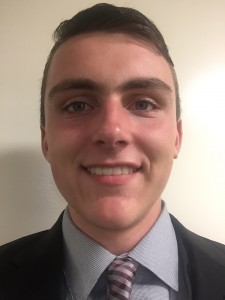In order to be more knowledgeable of the people and resources at this university, I had the task of interviewing different people at this university. Among the people I interviewed included an upperclassman, a teaching assistant (TA), as well as a professor that has written at least two peer reviewed scientific articles. The upperclassman I interviewed, Rebecca Hart, shares the same major as me. I also interviewed my calculus TA, Qing Zhang, as well as statistics professor, Mario Peruggia.
In order to get in contact with each individual, I had to go out of my way to reach out to them. For the upperclassman, I peered among the list of third year scholars and saw that Rebecca Hart shared my major. I decided that having a mutual major would be a good basis to interview the upperclassman. I emailed her saying that I was a freshman just getting adjusted to the school, and that I had some questions about settling in as well as being successful in the major. For the TA, I decided to contact my calculus TA, Qing Zhang. I was very interested to hear about his background, and the process of earning a PhD in mathematics. Finally, I interviewed statistics professor, Mario Peruggia, since statistics is a passion of mine, as well as a subject in which a lot of research is done. I searched several professors’ names into Scopus to find interesting, peer-reviewed articles. I found that Dr. Peruggia had written a few articles about Bayesian modeling, which is a topic I was interested in learning more about.
The interview with Rebecca was quite helpful in many ways. First off, she came to Ohio State from Albuquerque, New Mexico because it was one of the only schools that she could study both Korean and something related to computer science. I immediately made a connection because I come from out of state as well, largely because Ohio State is one of few schools that offer an undergraduate degree in Data Analytics. I also received some great insight on what classes I should expect to take, and those that I should especially prepare for. For example, she specifically struggled with systems, which is a course that is part of the data analytics curriculum, and suggested that I lighten my workload for that semester in order to have time to be able to focus on that class. She failed linear algebra the semester that she took systems because of how time consuming that class is, so it is a great thing to consider when mapping out my class schedules for the future. I also got some great tips about studying. I mostly have been studying either in my room or on the lounge of my floor due to convenience, but she brought up a great point about how the library has a lot fewer distractions. It is not realistic for me every time I need to get work done to go to the library, however on days where I plan on getting a lot of work done, the library will be a great place to go.
My TA interview was equally as helpful but in different ways. Dr. Zhang received his undergraduate education in China, so it was quite beneficial to gain insight from a different perspective. Perhaps the most interesting thing he said was that in China, students do not have jobs and have a minimal social life. Here, the primary purpose of a university is to study, but in his country it seemed like studying was the only purpose. He also added that for him, the most difficult thing about preparing for graduate school was passing an English test, which is much different from what my what my concerns may be. In terms of studying tips, he said that for math the primary way of studying is to do many practice problems.
Unlike the upperclassman and TA, finding a professor was a much more exhaustive process. I wanted to interview a statistics professor because that is my primary interest. However, I have not taken a statistics class yet, so I had no immediate connections. I decided to look at the list of faculty in the statistics department, and search the names of professors into Scopus to see if anyone had researched anything that seemed interesting. I saw that Mario Peruggia had done some extensive research on Bayesian modeling, which personally very interesting. He is an author of, “Semiparametric Bayesian approaches to systems factorial technology” and “Clustered Bayesian model averaging” among other scholarly articles. To be honest, I did not previously know much about Bayesian modeling beforehand, so these articles were personally very difficult to read. I knew that it is the process of combining several models in order to decrease uncertainty, but even with that knowledge the level of reading difficulty is quite high for someone who has merely completed introductory level classes in statistics. An advantage for articles of at this level of reading difficulty is that they usually contain accurate information. However, because so few people can understand it, the information needs to be greatly simplified in order for general people to understand, which brings people’s biases into play.
My interview with Dr. Peruggia was much more comprehensible than his articles. The first thing I asked him why one should pursue a graduate level statistics degree. He told me that it depends whether I want to go into industry, or want to do research. If my desire is to do research, then pursuing a PHD in statistics would be the right path. However, if I wanted to enter the industry, then using my degree in Data Analytics to get a job would be the way to go. Personally, I am not sure what I want to do with this degree yet. Nonetheless, when I figure out what direction I want to go, this information is quite useful. I do have an interest in doing undergraduate research, but he said that most of the research he does is with graduate students, and was unsure of where I should look for undergraduate research. Another notable topic we discussed was about study habits. He said that because of the fact that students in college have been in school for many years, they should have been able to figure out what works for them. And once you figure out what is best for you, continue to study in that manner.
There were many ways in which this project was helpful. First, I gained experience with reaching out to people for help. It is uncomfortable, and at some points even scary, to ask complete strangers for help. The truth is, however, that the vast majority of people are willing to help people that reach out for it, even if it is with a stranger. I also learned a lot from each of the people I interviewed, whether it was research, study habits, or possible directions I could take after graduation. There will be many points throughout my undergraduate studies and beyond where I will apply this experience, making it beyond worthwhile.

